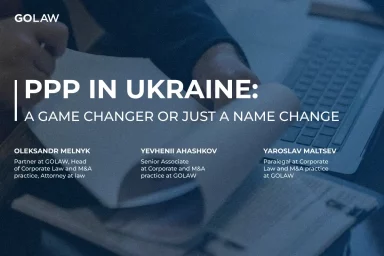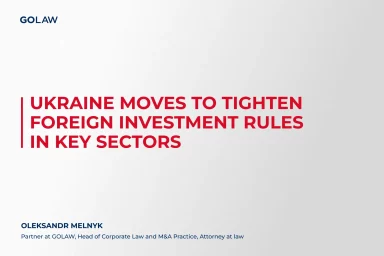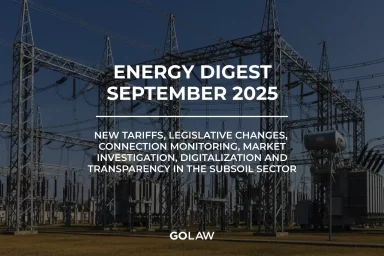Reform of subsoil use: from legislative changes to European integration
Contents
Legal framework
On 17 January 2025, Law of Ukraine No. 4154-IX came into force, amending the Code of Ukraine on Subsurface Resources and the State Programme for the Development of Ukraine’s Mineral Resources Base for the period up to 2030. In accordance with these amendments, the Government was authorised to amend the list of minerals and components and the lists of subsoil plots (mineral deposits) of strategic and/or critical importance (the – “Lists”). On 14 July 2025, the Cabinet of Ministers of Ukraine adopted Resolution No. 845, which amended the Lists. Reminder, that these minerals and subsoil plots may be granted for use through two mechanisms: by holding electronic auctions for the sale of special permits for subsoil use, and by concluding a production sharing agreement (the “PSA”).
These steps are part of a broader policy on the management of critical materials, which is being implemented under the Ukraine Facility. In particular, in the second quarter of 2025, international tenders are planned to be launched for the conclusion of production sharing agreements (PSAs) using standard terms and conditions. At the same time, it should be noted that legislative changes in Ukraine were adopted in the context of the European Act on Critical Materials (Regulation (EU) 2024/1252 11 April 2024), although they are not a direct implementation of this act. However, the directions of the reforms are significantly correlated with the European approach to strengthening strategic supply chains for raw materials.
New lists
According to the updated lists, 11 items have been classified as strategic minerals (uranium, titanium, zirconium, copper, nickel, tantalum, strontium). Another 28 items have been recognised as critical (lithium, rare earth elements, vanadium, gallium, indium, caesium, tin).
The government also detailed the instruments for accessing these resources:
- 23 deposits and 3 blocks can be transferred for use under PSA terms. The Surska, Novohurivska and Safonivska blocks, included in the new lists, have great potential. These three plots are uranium deposits, and Ukrainian businesses have already conducted exploration on them. Investors and the state are quite interested in uranium mining due to the need to meet the needs of the Ukrainian energy sector;
- 40 deposits and 15 blocks will be available for permits through electronic auctions. Among these sites, the Kruta Balka block stands out. Promising deposits of lithium, cesium, feldspar, tantalum, niobium and rubidium have been discovered on this plot. Given global forecasts that demand for lithium will grow to 6 million tonnes by 2030, these reserves are of strategic importance for the production of batteries and high-tech products.
At the same time, some of the deposits and/or sites on the lists are temporarily occupied, so they are inaccessible and cannot be exploited.
A new level of cooperation with the EU
A good example of this new level of cooperation with the EU is the inclusion of the Balakhivsk graphite deposit in the list of strategic projects under the European Commission’s decision of 4 June 2025. This decision was adopted in accordance with Regulation (EU) 2024/1252 and is a testament to the recognition of Ukrainian resources as part of Europe’s overall security of supply.
Obtaining strategic project status allows the Balakhivsk deposit to apply for funding from European instruments and to conclude off-take agreements, i.e. the advance sale of part of the production to investors, which lays the foundation for the economic sustainability of the project even before production begins. In addition, strategic project status provides for simplified licensing procedures at the EU level and priority consideration of funding applications. This is particularly important for Ukrainian projects, which often face bureaucratic obstacles in accessing European capital.
First steps in the restoration of the PSA
Among the first practical steps towards the restoration of PSAs, on 8 April, a decision was made to hold PSA tenders for the Svichanska and Mezhigorskaya fields located in western Ukraine. These will be the first production sharing agreements since the start of the full-scale war, and thanks to their safe geographical location, they are expected to be highly attractive to investors. In addition, on 4 April 2025, the Government amended the PSA for the Oleska block and transferred the rights and obligations of the investor to PJSC Ukrnafta, demonstrating further activation of the domestic production market.
By comparison, as of 2023, there were 12 hydrocarbon distribution agreements (PSAs) in force, and no new agreements have been concluded since then. Such changes and decisions, after a long “wait”, may indicate that the state is very interested in resuming PSAs and implementing such projects.
General terms and conditions of PSCs
The conditions for concluding an PSA are not clearly defined by law. They are determined separately for each investment object. However, the general conditions of an PSA may be the same as those for the Mezhyhirska and Svichanskaya blocks:
- the competition is open to Ukrainian citizens, foreigners, stateless persons, as well as legal entities of Ukraine or other countries and their associations that have the necessary financial, economic and technical resources, experience or qualifications in hydrocarbon production;
- the winner of the tender is obliged to invest at least UAH 1 billion (approximately EUR 210 million) in the first stage of geological exploration within five years. Mandatory work includes conducting electrometry and gravimetry of the entire site, 3D seismic exploration of at least 300-400 square kilometres (depending on the size of the site), drilling at least two exploratory wells and two wells to study the deep geological structure;
- the agreement is concluded for 50 years with a clear distribution of profits: a maximum of 55% of the compensation products are allocated to the investor to cover expenses, and the state’s share in the profitable products ranges from 35% to 65%, depending on the ratio of the fixed expenses to the maximum amount of compensation products;
- if deposits are discovered, the investor is obliged to ensure their industrial development and give preference to Ukrainian goods and services on equal terms.
Electronic auctions are available to companies of any size and have a lower entry threshold than PSAs. However, they have completely individual conditions for each auction. PSAs are usually applied to plots, while electronic auctions are used for deposits, which are much smaller in area than plots.
It should be noted that changes are currently being made to the terms of PSAs and electronic auctions due to the recent signing of an agreement between Ukraine and the United States to establish a joint investment fund. In addition to the inclusion of additional obligations, additional guarantees for partners are also expected to be introduced.
Opportunities for foreign businesses
Foreign investors have significant legal guarantees, including equal conditions with Ukrainian businesses and no special permits or restrictions on participation in tenders. Investment protection is provided in accordance with international agreements, with the possibility of international arbitration in the event of disputes.
Financial incentives include access to European funding for strategic projects, opportunities to conclude off-take contracts and preferential taxation for projects in the field of critical materials. Strategic advantages include early access to some of the world’s largest reserves of titanium, lithium and rare earth elements, proximity to European markets and participation in the formation of strategic EU supply chains.
Projects in western regions are particularly attractive, as risks are minimal and logistics links with the EU are well developed. Geographical proximity to European borders ensures not only investment security but also optimal transport costs for product exports.
Conclusion
The reform of subsoil use in Ukraine demonstrates a strategic shift in state policy on mineral resource management in coordination with European initiatives in the field of critical materials.
The legislative changes of 2025 created the legal basis for a differentiated approach to the management of 39 types of strategic and critical minerals through electronic auctions and production sharing agreements. Of particular significance is the granting of EU strategic project status to the Balakhovka graphite deposit, which opens up access to European funding.
Practical steps to implement the new policy demonstrate Ukraine’s readiness to effectively use its mineral and raw material potential even in wartime, laying the foundation for economic stability and strengthening its strategic role in ensuring Europe’s resource security.

Oleksandr Melnyk
Partner, Head of Corporate Law and M&A practice, Attorney at law
- Contacts
- 31/33 Kniaziv Ostrozkykh St, Zorianyi Business Center, Kyiv, Ukraine, 01010
- o.melnyk@golaw.ua
- +38 044 581 1220
- Recognitions
- The Legal 500 2024
- IFLR1000 2024 (International Financial Law Review)
- Legal 500 Green Guide 2024
- TOP-50 Law Firms of Ukraine Ranking | YURPRAKTYKA
Get in touch
To get a consultation, please fill out the form below or call us right away:Sign up to be aware
New achievements are inspired by information. GO further, don’t miss out GOLAW news and legal alerts
Our expertise
-
- Energy and Natural Resources
- Antitrust and Competition
- Banking and Finance
- Compliance, Corporate Governance and Risk Management
- Corporate and M&A
- Criminal and White Collar Defence
- Defense in Anti-corruption procedures and regulations
- Labor and Employment
- Natural Resources and Environment
- Government Relations (GR)
- Insolvency and Corporate Recovery
- Intellectual property
- International trade
- Legal support of business and private Сlients in Germany
- Litigation and dispute resolution
- Private clients
- Real Estate and Construction
- Restructuring, Claims and Recoveries
- Martial Law
- Tax and Customs
-
- Agribusiness
- Aviation
- Chemical industry
- Engineering, Construction and Building Materials
- Natural Resources and Environment
- Financial institutions
- IT and AI
- Industry and manufacturing
- Healthcare industries, Life sciences and Pharmaceuticals
- Media, Entertainment, Sports and Gambling
- Retail, FMCG and E-Commerce
- Transport and Logistics
We use cookies to improve performance of our website and your user experience.
Cookies policy
Cookies settings







